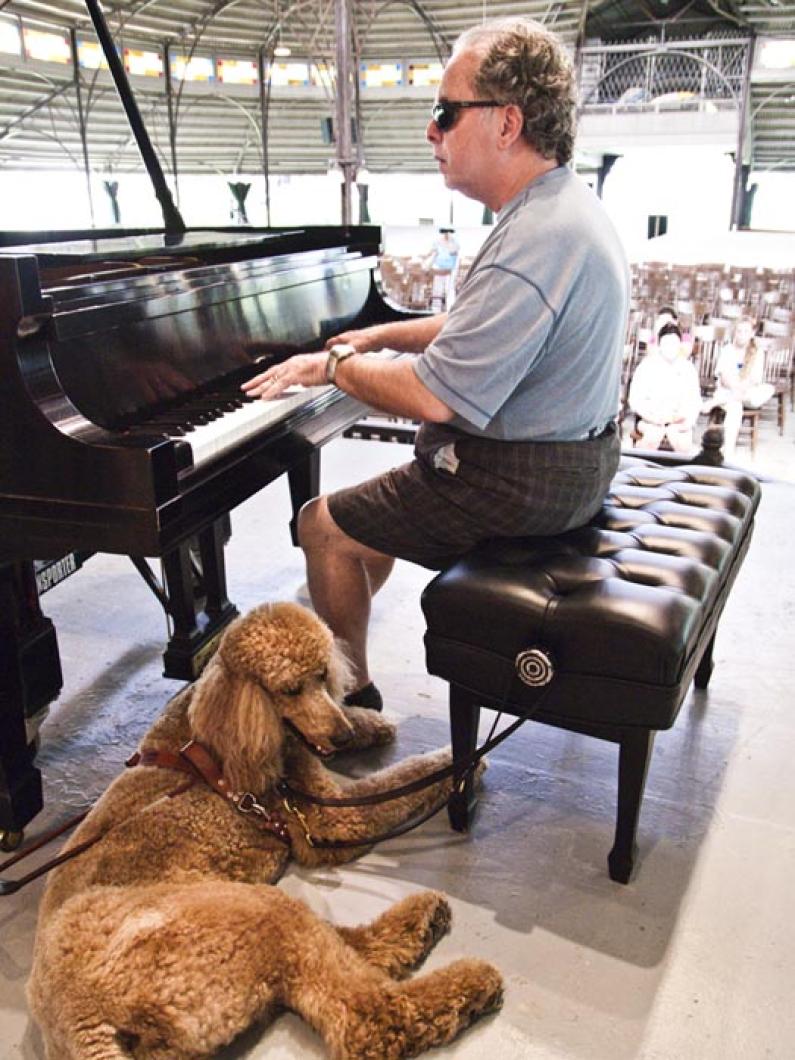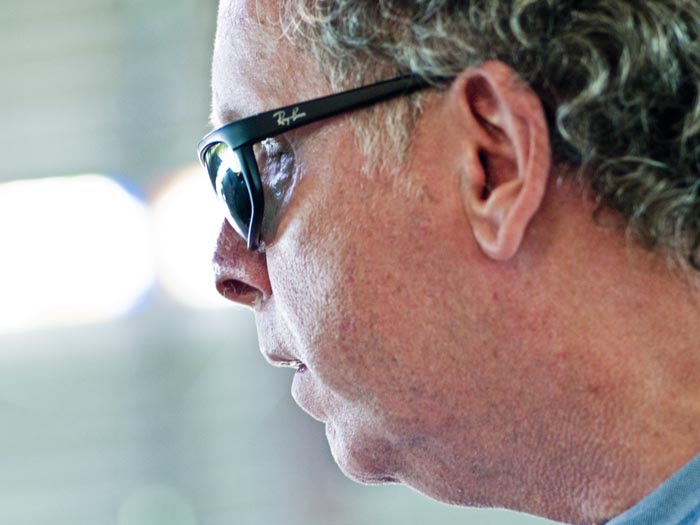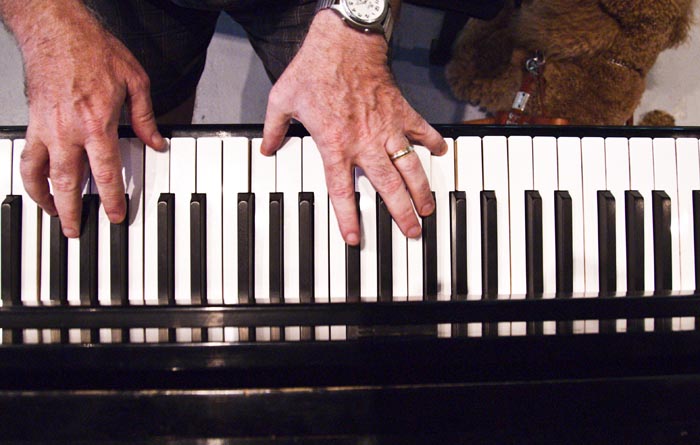There are very few musicians in David Crohan’s league. He says so himself.
But he says it modestly as if, after more than 60 years of playing, he is still surprised by the fact.
“I was given an extraordinary gift. I can hear a popular song, and I can learn it in five or six minutes, and immediately put together an arrangement of it,” said Mr. Crohan.
“Hardly anybody is in that league. I don’t say that in any way but in a spirit of humility, but it is a fact and it’s a gift. It just happens. How, I don’t know. If I listen to a recording of piece that I have played, and if I haven’t made a physical mistake, I can justify intellectually every single note in the arrangement I’ve made off the top of my head. I love that part of it.
“In every other respect I think of myself as pretty ordinary. Fortunately I have that one thing, and I’m more or less functional in the rest of my life.”
Fortunate indeed, for until Mr. Crohan’s musical abilities became apparent — at age three — his life circumstances were difficult.
Sixty-seven years ago next week, when he was born prematurely, he weighed just three pounds and was placed in an incubator, then a new piece of medical technology. So were a lot of other babies.
“And many of us were saved because of it,” he said. “But thousands of babies were caused to be blind. They did not at first realize that the oxygen levels have to be carefully watched, or too much will calcify the lenses. It took about three years for them to figure it out.”
But nature — or God, if you prefer — compensates, although Mr. Crohan was not always so accepting of the link between his blindness and his musicality.
In his younger days he “used to sort of resent” the suggestion that his gifted ear was somehow related to his sightless eyes. He used to think he would have been just as good a player regardless.
“I’m a little more objective now,” he said. “I know that if you go into a room with 100 random [sighted] people and another room with 100 random blind people, the level of musicality is going to be significantly different and the blind people are going to be more musical.
“One of our major senses is deprived and it stands to reason that others are therefore cultivated.”
At first, when he was very young, Mr. Crohan’s talent was self-cultivated, just by hearing popular music and playing it. Later, it was more formally cultivated, when he went to the Perkins School for the Blind in Boston, which had a strong music program.
“But it was all classical based and I was in fact somewhat discouraged from doing popular music and improvising. But that’s where I got the adulation from my family and why I could stay up late at their parties when all the other kids had to go to bed. That’s where the fun was,” he said.
So, he recalled, he resisted. When he was given “these little baby pieces” of classics to learn, he would ask his teacher to play them, “and I’d pick it up straight away and I didn’t read the braille music.”
Reading music in braille is painstaking. You have to read the parts for each hand separately. First, to learn the right hand part of a piece, you read it with your left, and play the notes with the right. Then to learn the left hand part, you reverse the process. Then you have to memorize them and put the two together, phrase by phrase, measure by measure, a few notes at a time.
Why do that when you can just rattle off a variation of a popular piece by ear?
Mr. Crohan’s attitude began to change when a teacher at the school, Edward Jenkins, also blind, introduced him to classics played on (then-new) hi-fi records, and sat with him, analyzing their structure, pointing things out, showing him the beauty in the music and persuading him he could play it.
“He was a genius. He knew more about music than I do now,” he said.
He also knew one of Mr. Crohan’s idols, the great, blind British jazz pianist George Shearing.
“And when I was 14 or 15 he introduced us and we got together to play one afternoon.”
They also talked for about an hour, during which time Mr. Shearing said the one regret of his great life in music was that he never had the sort of classical training available to Mr. Crohan.
“He said he had taught himself some classical music, but could not play it at the level I already could.”
Shearing told Mr. Crohan he had no doubt he could, with very little effort, become a very good player of popular and jazz music, and with more effort a very fine one.
“He also said, if you work hard you could become a really fine classical pianist too, and if you don’t do it, you’re a goddamned fool, because there are so few people who can have both those arrows in their quiver.
“And when someone of his stature says that . . . it was of course very motivating.
“I did work hard and went to the New England Conservatory of Music in Boston and I got three degrees in classical music there.”
At the same time, he began playing here on the Vineyard during summers, beginning in 1964.
He played a couple of longstanding gigs at different venues. “But it wasn’t enough, spiritually and economically,” and in 1978, he opened his own David’s Island House, which became a summer institution for almost 20 years.
Over the years, he came into contact with various of the Island’s famous residents and visitors, playing with some and for many more. Some of the Taylors, a bit of four-hands with Billy Joel on one occasion, jamming with (and buying dinner for) Jose Feliciano when he was an unknown.
He never managed to entice Bill Clinton in, despite leaving a saxophone in the window.
In 1997, though, Mr. Crohan left the Island to play full-time in Boston.
“I played in a place called the Big Tower room, on the 34th floor of 60 State Street in Boston, overlooking Logan Airport. It looked like planes were flying at it. Well, after 9/11, their business was just annihilated.”
There followed a difficult few months before he was enticed to Palm Beach to try out for a regular gig.
He wound up getting another one, at Café L’Europe, where he has been for the past eight years.
But now, Mr. Crohan is back, for his first full summer on the Vineyard in some 14 years. His main gig is playing four nights a week at the Boathouse club in Edgartown.
“Because the Boathouse is private and most of the people I know can’t get in to hear me play, I wanted to be somewhere a little more accessible to Island friends,” he said.
And so he will play on Sunday night at Seasons, beginning this week with two of his old musical collaborators, Hugh Taylor and Merrily Fenner.
But the big thrill for him will be Monday night, when he will perform a concert at the Tabernacle in Oak Bluffs, reprising a famous performance he first did there in 1976, a medley tracing the history of America through its music.
It will be his 67th birthday or, as he calls it, “the 17th anniversary of my 50th birthday.
“When I turned 50 I did a big concert in the Tabernacle. Walter Cronkite was the master of ceremonies, Patricia Neal sang and we had a wonderful jazz singer. Rebecca Paris sang with me, and a lot of Island musicians.”
So it will be a return to tradition — the re-establishment of David Crohan’s annual gigs — and birthday celebrations.
But it also is more than that. Part of the proceeds will go to the Freedom Guide Dog school, in upstate New York, “a small but very wonderful facility” which provided his guide dog, Walker.
And another part of the proceeds will go to the Massachusetts Military Heroes Fund, a group cofounded by Mr. Crohan’s son, Thomas.
“He worked for Senator Kennedy for a number of years,” said the pianist.
“His first assignment, when he was hired in August 2001, was to research the families who were impacted by 9/11, so the senator, when he called them, could have specific things to say that were personal and meaningful.
“Obviously it had an impact, because he’s started this foundation to help these and additional families, affected by the two wars. I’m trying to help them a little bit, too.”
So there are altruistic reasons to go to the Tabernacle on Monday night. Or you could just go to hear an extraordinary talent.
David Crohan’s benefit concert at the Tabernacle on Monday night begins at 8 p.m. The cost is $30 for general admission; $50 for premium seating which includes a reception with David at 7 p.m. Tickets are available at mvcma.org, the Cottage Museum and at the door.









Comments
Comment policy »